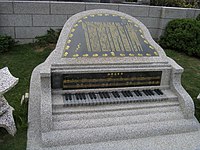music.wikisort.org - Singer
Bai Guang (27 June 1921 – 27 August 1999), also credited as Pai Kwong,[1] Bai Kwong[2] and Bai Kwang,[3] was a Chinese actress and singer. By the 1940s, she became one of the Seven great singing stars.[4]
This article needs additional citations for verification. (January 2022) |
Bai Guang | |||||||||||
|---|---|---|---|---|---|---|---|---|---|---|---|
 | |||||||||||
| Born | Shǐ Yǒngfēn (史永芬) 27 June 1921 Zhuozhou, China | ||||||||||
| Died | 27 August 1999 (aged 78) Kuala Lumpur, Malaysia | ||||||||||
| Burial place | Nirvana Memorial Park, Semenyih, Malaysia | ||||||||||
| Occupation | Actress, singer | ||||||||||
| Years active | 1943-1959 | ||||||||||
| Chinese name | |||||||||||
| |||||||||||
| Musical career | |||||||||||
| Origin | China | ||||||||||
| Genres | Shidaiqu, Mandopop | ||||||||||
Biography
Bai Guang was born Shi Yongfen (Chinese: 史永芬) in 1920 in Zhuozhou, Hebei.[5] Her father was a quartermaster under general Shang Zhen. In her early years, she was a student of the Beiping Salon Theatrical Troupe (北平沙龍劇團), and once performed Cao Yu's play "Sunrise". [6] In 1937, she studied at the University of Tokyo's music department until World War II in 1942. After drama school, she wanted to be a movie star. As she proclaimed, she wanted to be like the beams of light coming off the movie projectors onto the big screen. Hence, her stage name was Bai Guang (白光), which translated to "White Light".
Career
Her mandopop songs were often used in many of her movies as soundtracks. In an age and culture where light, higher voices were usually favored, she had a slightly deep and hoarse voice, which helped her become a big star in Shanghai.[7] People called her the "Queen of the Low Voice" (低音歌后).
Bai's big screen career started in 1943.[8] She was known for playing seductive roles due to her flirtatious image on screen and has also played villains at times. She lent a more dramatic tone or sexy attitude to her songs. Some of her hits are "Autumn Evening" (秋夜), "Without You" (如果沒有你), "The Pretender" (假正經), "Revisiting Old Dreams" (魂縈舊夢), and "Waiting For You" (等著你回來).
After the war, Bai Guang moved to Hong Kong and joined Great Wall Pictures. In 1949, A Forgotten Woman (蕩婦心) was shown in Hong Kong. Even the governor, Alexander Grantham, went as a fan.
By 1950 Bai tired of the low-quality films she was given and retired as an actress in China. After marrying an American GI in 1951,[citation needed] she lived in Japan and successfully opened a nightclub in Tokyo's Ginza District in 1953.[5] The union did not last, and she returned to Hong Kong, recording some music through 1959 when she officially retired. In 1969 she resettled in Kuala Lumpur, Malaysia, where she married a man 20 years her junior. She performed to wide acclaim in 1979 in Kaohsiung, Taiwan. Her last public appearance was in 1995 at Hong Kong's TV top 10 Chinese singer award presentation.

On 27 August 1999 she died in her house at Kuala Lumpur's Damansara Heights suburb due to colon cancer at the age of 78. She was buried at the Nirvana Memorial Park.[9][10]

Filmography
- Love Peas of Southland (紅豆生南國) (1943)
- The Fire of Love (戀之火) (1945)
- Sinister House #13 (十三號凶宅) (1947)
- Spy Ring 626 (六二六間諜網) (1948)
- Blood Stained Begonia (血染海棠紅) (1949)
- A Forgotten Woman (蕩婦心) (1949)
- Songs in the Rainy Nights (雨夜歌聲) (1950)
- A Strange Woman (一代妖姬) (1950)
- Hours Passed the Wedding (結婚廿四小時) (1950)
- Smiling Rose (玫瑰花開) (1951)
- Tears of Songstress (歌女紅菱艷) (1953)
- Fresh Peony (鮮牡丹) (1956)
References
- Peony (1956) film poster at IMDb.com. Retrieved 1 July 2019.
- 1964 Singaporean EP cover at Discogs.com. Retrieved 1 July 2019.
- Autumn Nights album cover at Discogs.com. Retrieved 1 July 2019.
- 魏君子 (2019-05-01). 光影裏的浪花:香港電影脈絡回憶 (in Chinese). 中華書局(香港)有限公司. ISBN 978-988-8572-49-6.
- 尤静波; 李罡 (2015-09-01). 中国流行音乐简史 (in Chinese (Taiwan)). Beijing Book Co. Inc. ISBN 978-7-5523-0844-0.
- "上海老歌星人物譜:一代妖姬 白光". 2018-12-26.
{{cite web}}: CS1 maint: url-status (link) - Baidu. "Baidu." Bai Guang. Retrieved on 2007-04-28.
- Music Sogua. "Music Sogua Singer profile Archived 2007-09-29 at the Wayback Machine." Bai Guang. Retrieved on 2007-04-28.
- 謝其章 (2010-05-01). 都門讀書記往 (in Chinese (Taiwan)). 秀威出版. ISBN 978-986-221-439-8.
- 吴剑 (2010-04-01). 何日君再来——流行歌曲沧桑史话(1927-1949) (in Chinese). Beijing Book Co. Inc. ISBN 978-7-5317-2450-6.
External links
- Bai Guang at IMDb
- Bai Guang songs online
- Bai Guang movie: A Forgotten Woman on YouTube
- Bai Guang Reminiscence of The Past on YouTube
- Bai Guang: Waiting for you on YouTube
- Actress at China's Movie Database
На других языках
- [en] Bai Guang
[es] Bai Guang
Bai Guang (chino: 白光, pinyin: Bái Guāng, [el nombre real: Shi Yongfen 史詠芬, pinyin: Shǐ Yǒngfēn], Pekín, 1921 - Kuala Lumpur, 27 de agosto de 1999) fue una actriz y cantante china. En los años 40, se convirtió en una de las siete famosas estrellas de la canción.[ru] Бай Гуан
Бай Гуан (кит. упр. 白光, пиньинь Bái Guāng; настоящее имя — Ши Юнфэнь, 27 июня 1922 — 27 августа 1999) — китайская актриса и певица. Она получила известность в 1940-х годах, как одна из семи великих певиц[2].Другой контент может иметь иную лицензию. Перед использованием материалов сайта WikiSort.org внимательно изучите правила лицензирования конкретных элементов наполнения сайта.
WikiSort.org - проект по пересортировке и дополнению контента Википедии